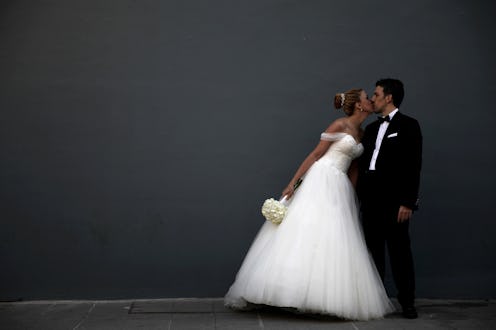Life
How Changing Your Last Name Affects You

To change or not to change? It's a debate that consumes the concern of many modern brides; surnames, and the possibility of keeping, changing, hyphenating you name — or doing something else entirely — are a part of the normal wedding milieu for many of us. (And that's not even getting into the complexity of the decision in queer marriages!) I kept my own name for the excellent reason that all of my overseas visas were registered in it and I did not have a giant pot of money available to change them; another friend took her husband's because she thinks it's prettier than her old one; and a couple at a wedding I recently attended left suggestion boxes on each table for a new married name they could both adopt. There are a lot of ways to navigate the last-name conundrum. But how does changing your name affect how people react to you and your marriage?
Surnames are actually a hot topic in one particular area of research: how employers react to "foreign-sounding" surnames, and the choice of immigrants to change them. Racial bias against particular name types that aren't familiar, whether conscious or not, is a big discrimination problem in the workplace. However, reactions to another surname choice, the decision whether or not to keep maiden names after marriage, haven't attracted as much attention until now.
And that's a shame, because it reveals a lot about attitudes towards feminism, gender roles, and ideas about what it means to be "committed" to a marriage.
How People React Depends On Their Education, Region, And Gender
Does taking your husband's last name mean you're "more committed" as a wife? Depending on who you talk to, the answer may be yes. That's the interesting result of a new study out of Portland State University, which assessed the responses of 1,243 adults to a survey about women, marital roles, and relationships.
It turns out that your perspective on women changing their name correlates pretty heavily with your own gender and level of education. Women didn't care, and neither did men with high levels of education; they held married women to the same standards of behavior and judged her identically regardless of whether she kept her own name or took her husband's. The one group that didn't like it? Men of low education. They were inclined to judge wives who kept their names more harshly, thought their husbands had more grounds for divorce, and believed they were "less committed" to the marriage. What's going on here?
Lower-educated men are an interesting proposition in social science. The Economist commented in 2015 that "poorly educated men in rich countries have had difficulty coping with the enormous changes in the labour market and the home over the past half-century." They've been greatly affected by the decline in low-skilled jobs in the labor market, and when President Trump famously declared that he "loved the poorly educated" on the campaign trail, he meant it; poorly educated white men were overwhelmingly in favor of his election. Lower education in dudes seems to be directly tied to less progressive views on gender roles, hence their grumbling about newfangled name-changing not indicating "commitment."
This may also differ by region. Studies of women in 2006 found that Midwest women were more likely to judge surname-retaining women as "less committed" than those from the eastern states. Where your family hails from, in other words, is also an influence on their views on the issue, and the conservatism of their reaction.
... And How You Feel About It Very Much Depends On Society
A collection of studies on surname change has discovered a series of indicators that you will or will not change your name. Catholic women, according to one, are least likely to keep theirs, while those with non-denominational wedding ceremonies are most likely. Higher levels of education are also connected to keeping maiden names, as were age (the older you are, the less likely you were to change) and how successful you are.
Interestingly, Claudia Goldin and Maria Shim argued in 2004 in a landmark paper on surname change that the Pill had a strong hand in the trend of surname change becoming less universal. "By increasing the age at first marriage and allowing more women to continue with their studies," they said, "the Pill was one important cause of the increase in surname retention." It's been located in other societal factors as well, though: sociologist Laurie Scheuble, interviewed by the New York Times in response to the 2015 news that surname retention was on the rise, pointed to a few of them. One was that couples are now more likely to live together before they marry, another that celebrities commonly retain their own names during marriage these days (or simply hyphenate, as Angelina and Brad did: RIP).
There's no right or wrong side to this debate; the personal choice is really the core of the issue, not choices for or against. Nevertheless, a lot of ink has been spilled on why women do or do not choose surname retention in modern marriage, while our understanding of how it shapes peoples' reactions is still evolving.